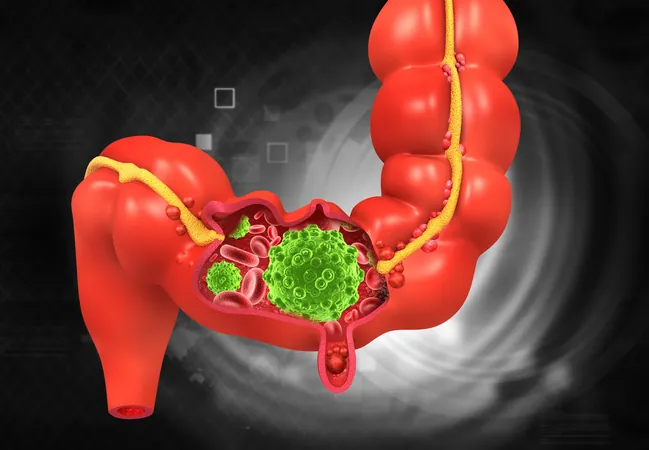
Revolutionary Findings: How Gut Microbes Could Transform Colorectal Cancer Detection
2025-06-05
Author: Sarah
The Microbiome’s Groundbreaking Role in Colorectal Cancer Detection
A landmark international study has opened new doors in the battle against colorectal cancer (CRC) by spotlighting the pivotal role of gut microbes in its early detection and ongoing monitoring. By delving into stool samples from more than 3,700 individuals across 18 different cohorts, researchers have mapped out the intricate microbial changes tied to varying cancer stages, tumor locations, and disease progression. This study, recently published in Nature Medicine, sets the stage for enhanced non-invasive stool tests, which could dramatically alter how CRC is detected and managed globally.
Understanding Colorectal Cancer: A Global Epidemic
Colorectal cancer stands as the third most prevalent cancer worldwide and is the second leading cause of cancer-related mortality. This disease manifests over extended periods, evolving through a sequence from benign adenomas to malignant tumors, but sadly, it often evades early detection. Alarmingly, only 40% of CRC cases are diagnosed before they spread, with five-year survival rates dropping to just 11% for stage IV colon cancer.
The Game-Changing Microbiome and Its Role in Cancer
The rise of stool-based tests, particularly DNA assays capable of detecting cancer cell traces, has revolutionized CRC screening. Recent studies have pinpointed specific gut microbes, such as Fusobacterium nucleatum and pks+ Escherichia coli, as players in CRC development. Not only do these microbes impact tumor biology, they also act as potential biomarkers indicating distinct cancer stages.
A Deep Dive into Microbial Signatures and Their Implications
Led by a collaborative team from the University of Trento, Masaryk University, and the Harvard T.H. Chan School of Public Health, the researchers embarked on a sophisticated journey utilizing metagenomic and machine-learning techniques. They unearthed 3,866 species-level bacterial genome bins, alongside other organisms, pinpointing key players like F. nucleatum, Parvimonas micra, and Bacteroides fragilis as significantly elevated in CRC samples compared to controls.
Interestingly, the study also unveiled 19 previously uncharacterized bacterial genome bins, shedding light on the complexity of the CRC microbiome and introducing new microbial entities that may influence cancer dynamics. One eye-opening discovery was the increase of oral bacteria, such as P. micra, in late-stage CRC patients, indicating a possible link between oral health and tumor progression.
Exploring Tumor Location: A Microbial Mapping
The study’s findings extended to the relationship between tumor location and microbial composition, revealing that specific tumor sites, like right-sided and transverse colon tumors, were rich in oral bacteria. In contrast, left-sided tumors displayed a greater abundance of certain Clostridia species, suggesting that the local tumor environment might uniquely shape the gut microbiome.
Transforming Diagnosis and Treatment Approaches
Integrating these discoveries into stool-based screening tests could significantly enhance the early detection of CRC. Identifying microbial shifts during the critical transition from benign to malignant states could allow for timely intervention. Additionally, insights about microbial transformations in advanced stages—like the presence of methane-producing Methanobrevibacter smithii—could open new pathways for monitoring disease progress and personalizing treatment.
Beyond Cancer: The Microbiome and Health Interconnections
The study reinforces the growing recognition of the microbiome’s influential role across various health domains, highlighting a continuum in microbiome changes throughout CRC progression. It draws intriguing correlations between CRC-associated microbes and those linked to cardiometabolic diseases, unveiling shared inflammatory pathways and risk factors.
Challenges Ahead: Understanding Causation and the Path Forward
Despite its promise, the study has limitations; being association-based, it can’t definitively link specific microbiome configurations to cancer progression. Nevertheless, the robust identification of microbial biomarkers paves the way for future research focused on causal relationships and clinical applications. As metagenomic data becomes more accessible, researchers are primed to refine microbiome-based diagnostics and develop targeted interventions aimed at exploiting microbial weaknesses.

 Brasil (PT)
Brasil (PT)
 Canada (EN)
Canada (EN)
 Chile (ES)
Chile (ES)
 Česko (CS)
Česko (CS)
 대한민국 (KO)
대한민국 (KO)
 España (ES)
España (ES)
 France (FR)
France (FR)
 Hong Kong (EN)
Hong Kong (EN)
 Italia (IT)
Italia (IT)
 日本 (JA)
日本 (JA)
 Magyarország (HU)
Magyarország (HU)
 Norge (NO)
Norge (NO)
 Polska (PL)
Polska (PL)
 Schweiz (DE)
Schweiz (DE)
 Singapore (EN)
Singapore (EN)
 Sverige (SV)
Sverige (SV)
 Suomi (FI)
Suomi (FI)
 Türkiye (TR)
Türkiye (TR)
 الإمارات العربية المتحدة (AR)
الإمارات العربية المتحدة (AR)